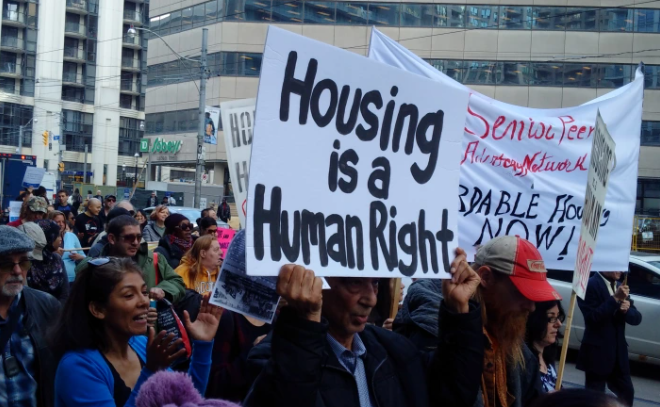Review Panels
Review Panels are new access-to-justice mechanisms introduced under the National Housing Strategy Act (NHSA) that reviews systemic issues found in Canada’s housing policies and investments, while putting the experiences and dignity issues of those most affected at its centre.
Past & Current Review Panels
On Friday, May 11, 2023, the Federal Housing Advocate directed the National Housing Council to launch a human rights-based review panel on the Government of Canada’s failure to prevent and eliminate homelessness amongst women and gender-diverse people, and particularly those who are Indigenous. This issue has reached such a crisis point that the Federal Housing Advocate now recognizes it as one of the top human rights issues in Canada.
Financialization of housing refers to the treatment of housing primarily as a financial asset and tool for maximizing investor profit at the expense of human rights among tenants and tenancy-seeking individuals.
UPDATE: The Financialization Review Panel concluded in May 2024. After analyzing over 190 written submissions from across Canada and hosting 8 oral hearings, the review panel released its final human rights-based recommendations to the federal Minister of Housing on May 29, 2024.
What are Review Panels?
Review panels are one of the key oversight and accountability mechanisms created under Canada’s right to housing legislation of 2019, the National Housing Strategy Act (NHSA). They offer a new avenue for access to justice that puts the experiences and dignity issues of those most affected by Canada’s housing policies and investments (or lack thereof) at the centre.
Review panels rely on public participation from individuals and communities, and involves multiple open hearings (written and oral) to gather evidence of systemic human rights violations in housing that will be used to create human rights-based findings and recommendations directed to the Government of Canada


A Key Human Rights Approach
Review panels are important because this is the first time a human-rights process is being used to address systemic housing issues in Canada, and the findings and recommendations from the hearings will be tabled in the House of Commons where the federal Minister of Housing will be required to respond with a plan of action within 120 days. This means there is clear accountability—the Government of Canada can’t simply ignore the recommendations raised.
Have questions? Visit our FAQs.
“Review panels are a new participatory human-rights based accountability mechanism established… to support the progressive realization of the right to adequate housing in Canada, as recognized under the International Covenant on Economic, Social, and Cultural Rights.”
– National Housing Council
Review Panel FAQs
Review panels are made up of a multiple open hearings that fall under two categories: written and oral.
In both written and oral hearings, individuals and organizations are encouraged to submit evidence of systemic human rights violations in housing, as it relates to the topic of the review panel, and propose solutions.
The review panel will then use the evidence and findings to create human rights-based findings and recommendations to the Government of Canada.
Yes! Even without making a submission, you can support our efforts by following us on Twitter, Facebook, LinkedIn, and sharing information about the review process with others. Sharing your stories and testimonies with local and national housing organizations can also make a difference. Every small contribution, such as spreading awareness and sharing experiences, helps in ensuring this review process is a success.
The second review panel was recently announced. This next review panel will look at the Government of Canada’s failure to prevent and eliminate homelessness amongst women and gender-diverse people, particularly Indigenous women, gender-diverse, and Two-Spirit people. This review will begin in 2024. You can learn more about this review panel here.
Written Hearing FAQs
Written submissions may be made by:
- Individuals and members of communities affected by the issue under review. Submissions may be made on behalf of someone else, provided you have their explicit consent to do so.
- Experts on human rights, including but not limited to, the right to adequate housing and related rights recognized under the International Covenant on Economic, Social and Cultural Rights and other international treaties.
- Experts on housing including but not limited to, individuals and organizations with expertise on the housing system and housing policy and those involved in the development and/or provision of housing (market and/or non-market).
- Others with an interest in the issue under review are also encouraged to make a submission.
Please note: Review panels are focused on systemic housing issues. They are not for individual complaints and cannot provide a resolution for housing issues an individual may be experiencing. People who need help to resolve an individual housing issue are encouraged to reach out 211.ca to access services in their community.
Please refer to the review panel you are interested in making a written submission to here.
If you’re unable to make a submission alone and have no one to make a submission on your behalf, contact us and we can connect you with your local or national housing organization who can help.
Yes. Submissions may be made on behalf of someone else, provided you have their explicit consent to do so. You will be asked to confirm that you have consent when completing a submission on someone else’s behalf.
What you cover in your written submission is ultimately up to you! However, we recommend structuring your submission with an overarching theme to maintain clarity.
Some examples of submissions from the first review panel on the issue of financialization included/covered:
- Impact of financialization on tenants and tenancy-seeking individuals
- Accessibility issues for those with disabilities
- Rights of Indigenous peoples
- Mechanisms or tenant/renter protection
- Regulating financialized landlords
- Jurisdictional responsibility
- Discrimination of racialized communities
… and much more!
If you choose to use the built-in text box in the submission portal, you may type a submission of up to 5,000 characters (about 1,000 words). If you are making a longer submission, you may choose to upload a document of up to 5,000 words.
Yes! We understand that creating a written submission for a review panel can be a big undertaking. To help make this process as easy as possible for you, we’ve created a couple of resources:
We encourage you to use these resources in whatever way works best for you—and if you still need additional help with your written submission, please feel free to contact us here.
Incorporating human rights language into your written submission is an effective way to link the issue you’re submitting about to the federal government’s legal obligation to fully realize the right to housing in Canada. Furthermore, by incorporating human rights language, you can help shift the perspective of housing from charity to obligation, from aid to dignity, and from privilege to human right.
Review our guide on how to incorporate human rights language to learn more.
Yes! Even without making a submission, you can support our efforts by following us on Twitter, Facebook, LinkedIn, and sharing information about the review process with others. Sharing your stories and testimonies with local and national housing organizations can also make a difference. Every small contribution, such as spreading awareness and sharing experiences, helps in ensuring this review process is a success.
Great! If you’d like your written submission to be featured on our website (where your submission will be available to the public), send it to us here.
-
- When you submit your response online, you’ll get a confirmation number. By email, you’ll receive an email confirming receipt. If you submit by mail and provide a return address, you’ll get a confirmation letter.
- The National Housing Council Secretariat will assist the panel members in reviewing and analyzing the evidence submitted in the written hearing.
- Based on the written submissions, the panel will select individuals and organizations for the oral hearing. They will receive further instructions and support if they accept the invitation.
- Once the hearing is completed, the panel will analyze all the evidence and create a report with their opinion and recommendations on the housing issue. The report will be sent to the Minister responsible for the NHS Act, who must respond within 120 days.
The review panel’s report will be published on the National Housing Council website.
Oral Hearing FAQs
Everyone who made a submission in the written hearings could be invited to present their findings and evidence in the oral hearings portion of a review panel. Those selected to participate will be contacted by the review panel staff. Participants will then receive further instructions and support if they accept the invitation.
The oral hearings for the first review panel (the on topic of the financialization of rental housing) was streamed live. The recording of the oral hearings was then posted public on the National Housing Council’s website here.
Updates on whether future review panel oral hearings will be streamed and uploaded online has yet to be announced.
Once all the open hearings are completed, the panel will analyze all the evidence and create a report with their opinion and recommendations on the housing issue. The report will be sent to the Minister responsible for the National Housing Strategy Act (NHSA), who must respond within 120 days.
The review panel’s report will be published on the National Housing Council website.
The full oral hearing record for the review panel on the financialization of purpose-built rental housing can be found on the National Housing Council’s website here.

